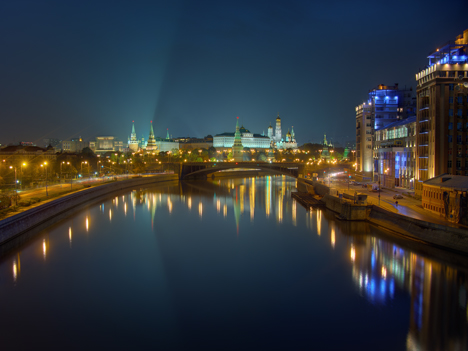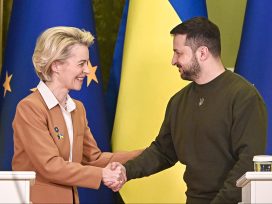Should Russia be held responsible for domestic and international crimes committed by the Soviet Union? If so, to what extent and in what way? Who might possibly be held accountable for these crimes? Or, to be more precise, who would carry the various types of responsibility – the moral and legal responsibility, and the responsibility of remembrance as it is memorialized.
What makes answering these questions difficult today is the fact that all the crimes committed by the Soviet Union have become mixed up in the public mind, jumbled up together rather than separated out and considered individually and according to the culprit and the degree of guilt.

The Kremlin, Moscow. Photo: Alexey Kljatov. Source:Flickr
Most importantly, what is lacking is public awareness of the extra-legal, criminal nature of the Soviet regime as such, an awareness that regards as criminal all of the regime’s functions and activities, every aspect of its policy, both domestic and foreign, and, above all, those aspects that made the Soviet justice system so unjust.
The situation is further complicated by the fact that the USSR, and later Russia, have developed and perpetuated a surrogate form of justice and determining guilt: the execution of Nikolai Yezhov and the limited investigation into Yezhovshchina, Nikita Khrushchev’s speech at the 20th Communist Party Congress, which laid all responsibility for Soviet crimes up until then exclusively on Stalin, the silent and incomplete rehabilitation of those convicted of “political crimes” under Khrushchev, the glasnost era when it was possible to write about Soviet crimes openly, the Russian Constitutional Court decision banning the Communist Party of the Soviet Union, laws on the rehabilitation of the deported nationalities and victims of political repression. However, these are all just half remedies, which have created an illusion of justice being restored, albeit only in part, while at the same time lowering the bar in respect of demands and blurring the lines of responsibility since none of them has brought tangible results in terms of the culprits being named and brought to justice.
Because of this, Soviet-era crimes have been discussed in isolation from the criminals, giving the impression of having been committed by fate or history in the abstract, rather than a violent state machinery embodied in its actual representatives.
It is no coincidence that under perestroika the concepts of general undefined guilt and desirable repentance were more widespread than the concepts of crimes and responsibility for them. The notion of repentance, carried over from the religious sphere into the secular realm negates responsibility to some degree, making it possible to substitute pseudo-theological moralizing for specific judicial and political practice. Once the personal act of repentance, imbued with a strictly internal, individual meaning, is applied en masse, it turns into a spiritual sham that diverts public debate away from the criminals and their crimes and away from judicial guilt – which can only be established by legal means and therefore envisages a specific legal responsibility – and towards an undifferentiated, abstract guilt that seemingly applies to everyone in equal measure. This results in a predictable rejection of the very idea that the past must be subjected to reassessment.
Let me offer a broad-brush typology of Soviet crimes to facilitate a more meaningful conversation.
Domestic policy:
– Class-based crimes: “de-kulakization”, discrimination based on social origin; physical extermination of individuals with the “wrong” social identity;
– Crimes based on nationality: deportations of Chechens, Kalmyks, Karachaevs, Greeks, Crimean Tatars, Germans, Koreans, etc.; “nation-oriented” actions carried out by the NKVD;
– A mix of class and nation-oriented crimes: deportations of social elites from the conquered countries, elimination of their intelligentsia; the Katyn massacre;
– Crimes against freedom of conscience and religion: war on religion, expropriation and destruction of churches, physical annihilation of the clergy;
– Crimes against the right to ownership: expropriation and nationalization of property.
Foreign policy:
– The waging of wars of aggression resulting in human casualties (Poland, Finland, Afghanistan);
– Occupation and annexation of independent nations (Lithuania, Latvia, Estonia);
– Occupation of independent nations and installing loyal regimes (in all “socialist camp” countries);
– Ideological and material support for tyrannical regimes, associated with human casualties and violations of rights and freedoms: North Korea, Cuba, African countries, etc.
Given the enormous complexity of this typology of crimes and their vast scale and all-encompassing nature, virtually every citizen ends up being directly and at least morally complicit in acts of violence, in the same way that a gang tries to ensure its members are bound by ties of blood in order to compel them to loyalty and silence before justice.
The roles of the criminal and victim are interchangeable. A de-kulakized Russian peasant sees the NKVD officer as the criminal. From the point of view of a deported Latvian whose country was invaded by the Red Army, the peasant, too, bears partial responsibility for the intervention. And for a citizen of Czechoslovakia in 1968, the children of all those listed above who served in the Soviet Union’s army are representatives of the aggressor country.
The Soviet system, Janus-like as both domestic and foreign aggressor, created this double identity of victim-invader, victim-criminal, which cannot be easily subjected to moral judgment.
The very nature of totalitarian power, which suppresses its citizens’ rights and freedoms, enables the citizens to claim, at a later stage, that “this was nothing to do with us”. The attraction of a totalitarian system that deprives individuals of their freedom of choice and responsibility for their own fate turns, in time, into a metaphysical alibi in an endless passing on of guilt. This is how a vicious cycle of responsibility without agency comes into being.
The only way this vicious cycle can be broken is for society to accept primary responsibility for having allowed and tolerated the totalitarian system, for not resisting sufficiently, for collaborating with it. Only once that has happened does the responsibility for the crimes of the totalitarian state come into play.
It is this kind of discourse that is missing from Russian public consciousness. Its absence leaves the responsibility for Soviet crimes suspended in limbo, with a key link missing.
Those who refuse to accept responsibility for having allowed the totalitarian system to come into existence are reduced to mere puppets and victims; they cannot be called to account. A victim has no responsibility, a victim is passive.
It is no coincidence that Russian culture lacks a history of Resistance. There have been instances of opposition to the totalitarian system – from peasant uprisings in the early years of Soviet power, through covert resistance to collectivization in the 1930s, large-scale wartime national underground organizations, to anti-Stalinist youth circles in the 1950s, and the dissident movement. Opinions may be divided on the scale and effectiveness of this resistance but what matters is something different: those who refused to be passive victims – such as the seven individuals who dared to protest against the invasion of Czechoslovakia in Moscow’s Red Square – never received public recognition.
Their example disrupts the infernal comfort of the victim position, serving as it does as a reminder of the primary responsibility – the responsibility for allowing the totalitarian system to happen, the citizens’ responsibility for the regime.
What further complicates the issue of Soviet crimes nowadays is the extended historical perspective, analogous to the expiry of the “statute of limitations”.
However, a people who do not accept responsibility will end up punishing themselves since their collective identity – the identity of those who proudly persist in rejecting their guilt – breeds a false solidarity, the solidarity of criminals. Not only do people begin to justify the crimes of the past (“collectivization was a necessary precondition of industrialization”, say), they start to feel proud of those who have committed them. This is a path to self-destruction in mass cultural and individual terms.
The perpetrator of a crime has a chance to take responsibility. But a perpetrator who denies responsibility commits a fresh crime, aggravating the original one.
This gives rise to a tautologically recurrent pattern, also requiring one to accept responsibility for not having taken responsibility before. This leads into a moral dead end and that, in turn, generates various strategies of denial, such as the diffusion or relativization of responsibility. These strategies are often mixed and rarely occur in a pure form.
There is the “barefaced” denial of responsibility: from the controversial claim that the GULAG didn’t exist, that Stalinist crimes were “invented” during perestroika to malign the Soviet system, right up to repeating the Soviet line that everything that happened was justified and those who faced the firing squads were executed for things they had really done.
There is also tactical denial, which understates the number of victims, citing mitigating circumstances and historical necessity with the mantra “in those days there was no other way”.
There is diffusion of responsibility, where people seemingly acknowledge guilt but chip away at it until it completely disappears – everyone is guilty, i.e. nobody is guilty – or where they shift the blame onto the “Soviet people” as a historical agent that no longer exists; or declare that we are different simply as a result of the passage of time and a change of historical scenery.
Then there is the relativization of responsibility: the Baltic nations collaborated with the Nazis and killed the Jews, the Finns provoked the war themselves by failing to concede to our just demands; America made deals with Hitler and denied the rights of African Americans; Russian peasants suffered no less than Ukrainian ones and the Holodomor was not a man-made famine, just hunger; the USSR made such an enormous contribution to the development of the neighbouring nations that the label occupation is inappropriate – so ultimately no one is clean, everyone got their hands dirty, no one has the right to reproach anyone else as everyone is tarred with the same brush.
There is also the deferral of accepting responsibility, the most psychologically credible theory: guilt does exist but we are not yet ready to accept it; we need time, each of us needs greater moral psychological capacity, which is presently lacking. There is probably something to this theory but under the present circumstances it enables people to put off the issue of responsibility to some undetermined, merciful “tomorrow” and later, when this “tomorrow” doesn’t materialize, come up with a convincing explanation for why a further deferral is necessary.
There is also the theory that responsibility can be “removed“, that guilt can be redeemed, arising from our victory in World War II, an achievement that redeems all sins past and future. This theory is based on the misleading assumption of a unified, undifferentiated Evil, meaning that the force (USSR) that defeated Evil (Germany) should automatically be considered (or becomes in the course of the transformational war and the nation’s heroic feat) Good, with the added bonus of offering absolute moral indulgencies.
By dodging the posing of the question of responsibility in all these ways, totalitarian populists were able to rise to power in Russia. These people with a background in the special forces, the Soviet state machinery of violence, have overtly or covertly exploited the fear and discomfort of accepting responsibility, making skilful use of imperial complexes and the need to justify the past.
While the original totalitarian regime openly crushed its citizens, its post-totalitarian successor strives for a more genuine and true unity. It does so by playing the role of a phony psychotherapist who frees the people from the need to make any ethical effort. It establishes a “positive” continuity with the Soviet past, a continuity that is emotional and symbolic rather than normative and judicial, lest other countries that believe themselves to have suffered at the hands of the USSR pursue the issue of responsibility in legal terms. In this way it cultivates in society an approval of historical and judicial impunity not only in relation to the past but also the present: this process culminated in the wave of “patriotic” exultation unleashed by the military annexation of Crimea.
I believe that Russia’s democratic movement needs to develop a cultural and political strategy based on the premise that impunity for Soviet-era crimes has engendered the present-day authoritarian Russian state. Society’s acceptance of its share of responsibility for tolerating the past totalitarian regime should be reflected in concrete legal steps that condemn Soviet crimes, set up a mechanism for material compensation, open up the archives and develop a programme of commemoration; in relation to the present day this should take the form of lustration that will restore functioning democratic institutions by barring from power anyone who has committed crimes against democracy in the new Russia.
No such thing happened in 1991. And this is a mistake that must not be repeated.







